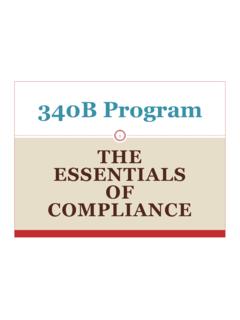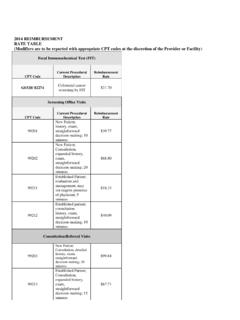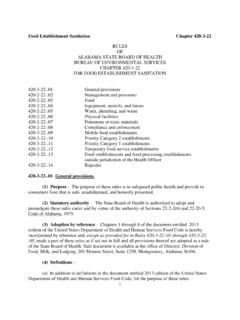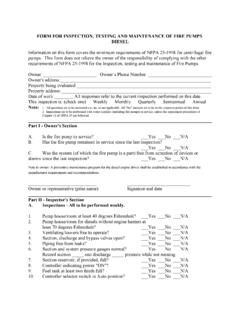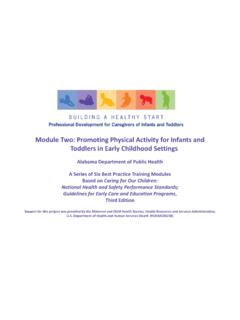Transcription of REQUIRED SKILLS AND VALUES FOR EFFECTIVE CASE …
1 REQUIRED SKILLS AND VALUES FOR EFFECTIVE case MANAGEMENT There are numerous SKILLS that case managers will use to accomplish what is needed for a client, and each case manager will develop his or her own personal style of performing those SKILLS . Some case management SKILLS are learned informally through life experiences while others are learned theoretically and developed through formal training. Some will be easier to master than others. In addition to a set of SKILLS , the case manager needs to put into practice some basic VALUES of the helping relationship. These VALUES help the case manager ensure that actions taken demonstrate respect for those with whom the case manager works. It is often quoted that People don t care how much you know until they know how much you care. The development of a helping relationship with clients and referral sources is strongly influenced by the case manager s projection of attitudes of respect, empathy and cultural sensitivity toward others.
2 This idea is supported by Brammer (1993) who reviewed numerous studies and concluded that the worker s personal skill in self awareness, dedication to personal congruence and the projection of positive attitudes is as significant in helping clients as the methods that are [1] When the basic case management SKILLS and VALUES are demonstrated, case managers are able to accomplish the tasks needed to be successful. The essential case management SKILLS and VALUES that will be addressed in this training are as follows: Interviewing SKILLS Communication Teaching Critical Thinking Negotiation and Collaboration Advocacy Termination of case Management Services Choice and self -determination Cultural Diversity Quality of Life Quality of Care 1. Interviewing SKILLS : case managers frequently conduct interviews to obtain and provide information needed to carry out the case management process.
3 Interviews may be conducted face-to-face or they may occur by telephone or in writing. The method used to conduct the interview may be set by program policy and procedures. In other situations, it may be a choice the case manager can make based on the method that would be most EFFECTIVE and efficient to meet the objectives of the interview. 1[1] Woodside, M. & McClam, T.(1998). Generalist case Management. Pacific Grove, CA: Brooks/Cole, p. 113. An interview may be conducted with only one other person or it may include a group of individuals, such as a family. Some interview techniques used may vary based on the individuals involved in the interview. For instance, an interview with the child will require a different approach than an interview with a senior adult. Regardless of the method used, the case manager would be wise to prepare for the interview.
4 Preparation will help insure that the goals of the interview are met, that the flow of the interview is organized and purposeful, and that the length of the interview is no longer than necessary. It can also help build the case manager s level of confidence. The following are some pointers to assist with preparing for the interview. Know the purpose of the interview and what needs to be accomplished. What is the expected outcome? Outline for yourself the information that needs to be provided and obtained. Gather all forms that need to be completed or signed during the interview and make a bullet list of questions that need to be asked. Educate yourself regarding the key facts and topics to be discussed during the interview. Gather factual information that may be helpful. Be aware of your own personal biases about the interview as they may sway the outcome.
5 Be careful to approach the interview with an open mind. Dress in a manner that is appropriate for the location of the interview and the standards set by the case management employer. Make an appointment for the interview, if possible. This demonstrates respect and helps insure that the individuals involved will have sufficient time set aside to fully participate in the interview. At the time of the interview, the following are some pointers that may help make it successful. Demonstrate respect for the interview participants. Be on time. If that is not possible, offer to change the appointment time or at least give an explanation about the reason for being delayed. Greet the participant(s) by name and introduce yourself and others present. Explain the role and/or relationship of everyone involved in the interview. State the purpose of the interview and approximately how long it should take to complete.
6 Relieve the tension in whatever way suits your personality as long as it is respectful of the participants. If you plan to take notes during the interview, let the participants know in general terms the reason notes are being made and how they will be used. Use a conversational style of interviewing and vary the type questions asked. Close ended questions that can be answered by a quick yes or no are good for obtaining basic facts or clarifying your understanding about something. Open ended questions invite the client to provide more information and usually begin with the words who, what, where, where, or how. Start the interview with questions that are less personal and save more personal or controversial questions for later in the interview when the participant may feel more comfortable and may have a higher level of trust in the case manager.
7 Ask one question at a time and keep wording simple and specific. Define any terms that may be unfamiliar to the participant. Keep the wording of questions as neutral and non-judgmental as possible. Avoid leading questions. Leading questions project the case manager s VALUES and may cause the participant to say what they think the case manager wants to hear or what may be the correct answer. Be aware that why questions tend to put people on the defensive and should be used with caution. Why questions can usually be rephrased into questions that will be perceived as less offensive and threatening. Find a balance between structure and flexibility. Keep the purpose and objectives of the interview in mind, but be flexible with the flow of questions and information provided. Avoid spending a lot of time on subjects that do not meet the objectives.
8 At the same time, avoid turning the interview into a question and answer session. The interview should flow naturally from one subject to another. Reflect your empathetic understanding which shows the person your non-judgmental respect for their thoughts, feelings, lifestyle and culture. Practice active listening SKILLS . Avoid filling in all moments of silence with questions or comments. Silence can actually allow a person to reflect on what was said and identify additional information that needs to be shared. When there is silence, pause a few seconds before asking another question. Give participants in the interview an opportunity to ask their own questions or to clarify anything that was discussed. Close the interview with a review of the information discussed and facts gathered. Review any follow-up that is to be done by the case manager or others involved in the interview.
9 Thank those involved for their time and participation and make sure that they know how to reach you if they have questions or want to provide additional information at a later time. The environment in which the interview takes place can also affect its success. Following are some environmental factors to consider. Room arrangement is important in supporting the client s comfort level. Studies have shown that persons are more willing to share personal information if the interview room is arranged so that the case manager s chair is not behind a desk. Talking with a person from behind a desk implies a position of authority which impedes trust between the participant and worker. In the home setting, sit near the participant and at an angle and level that will allow direct eye contact. The interview should be held in a private space where the participant can talk without being seen or overhead.
10 If there are others around who may overhear the interview, talk with the person about any concerns they may have regarding this. Address your agency s policies about confidentiality. Minimize noise and distractions as much as possible. Silence beepers and cell phones. If the interview is conducted in a home setting, ask for permission to cut down the volume or turn off televisions or radios during the interview. People tend to be feel more comfortable and in control when they are in a familiar environment. The purpose of the interview will help determine the best setting. 2. Communication The ability to use communication SKILLS that successfully convey and obtain accurate and complete information in a respectful and caring manner is essential in developing positive relationships with both individuals being served and referral sources. A case manager relies on communication to carry out even the most basic job responsibilities.




